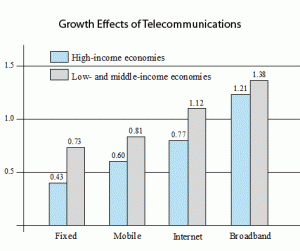Broadband and Economic Growth in Africa
Introduction
In the Ghanaian capital Accra, a government minister takes questions from citizens via Facebook. A journalist in Kenya uses his smart phone to e-mail breaking news instantly from a corporate press conference; the announcements move shares on the Nairobi Stock Exchange. Technology is rapidly changing Africa and at the forefront of the impact of that change is access to broadband Internet. Broadband would be to an economy in the 21st century what electricity was in the 19th century. Empirical evidence has established a correlation between broadband and gross domestic product (GDP) and the growth effects of telecommunications.
In 2009, the World Bank released its Information and Communications for Development report that showed access to broadband boosts economic growth in all countries, but most especially in developing ones. The study showed that in developing countries, for every 10 percentage points of broadband penetration, their economies grew by 1.38 percent. The report, conducted in 120 countries between 1980 to 2006, developed countries’ economies grew by 1.21 percent. Broadband access is key for economic growth and even more vital in developing countries.[1]. Africans are seizing the opportunity that it offers to move their economies forward.
Definition
Broadband is usually defined as any always-on, high-speed connection to the Internet, whether from a computer, television, cellphone or other mobile technology. The Organization for Economic Cooperation and Development (OECD) specifies a download speed of 256 kilobits per second or higher as constituting broadband. But recent studies have redefined broadband as an “ecosystem” that ranges from the networks, to the services the networks carry to the applications they deliver and the users.[2]
GDP Growth
Africa has sustained economic growth above 5 percent since the beginning of the 21st century with a peak in 2007 at 6.1percent. Growth declined slightly in 2008 and 2009 due to the global financial and economic crisis.[3]
Overall investment with private involvement represented an average 1.3 percent of Africa’s GDP between 2004 and 2007. In absolute terms, in 2004-2007 Africa attracted on average $11.5 billion, behind OECD and Central Asia with $19 billion and Latin America and the Caribbean with $13.3 billion, and slightly ahead of South Asia with $10.8 billion. East Asia and Pacific countries lagged behind with $5.3 billion.[4]
Telecommunications and GDP
McKinsey & Company estimates that “a 10 percent increase in broadband household penetration delivers a boost to a country’s GDP that ranges from 0.1 to 1.4 percent.”[5] Booz & Company also found out that “10 percent higher broadband penetration in a specific year is correlated to 1.5 percent greater labor productivity growth over the following five years.”[6]
Tunisia’s Ministry of Communication Technologies show that the ICT sector has grown by 17.8 percent in 2008. Its contribution to the country’s GDP reached 10 percent that year, against just 3.9 percent in 2001. The ministry projects growth will reach 13 percent by 2011.[7]
Source: IC4D 2009: Extending Reach and Making Impact
A World Bank report showed that between 1998 and 2008, mobile phone subscribers in Africa soared from two million voice users to 400 million with $56 billion in investment. A total of 65 percent of the African population gets mobile phone coverage, but that only covers 30 percent of the continent’s territory. And mobile phone companies make more money off African subscribers: average revenue per user is $12 each month, compared to $6 in India.[8]
There may be more people using mobile phones than have broadband access, but the table above shows broadband has a much stronger direct correlation to economic growth than access to a cellphone, landline or other Internet platforms. More broadband means faster economic growth.
Investing in broadband is an investment in economic growth and an indirect investment in development.[9] If broadband is made accessible and affordable, it would have a direct impact on health, education and standard of living; the three main indicators in the UNDP Human Development Index (HDI).
[1] http://web.si.umich.edu/tprc/papers/2005/450/L%20Waverman-%20Telecoms%20Growth%20in%20Dev.%20Countries.pdf
[2] World Bank, Building Broadband: Strategies and policies for the developing world
[3] AfDB, AU, UNECA, African Statistical Year Book 2009
[4] Telecommunications Investments with Private Participation (PPI) in Africa, World Bank PPI Database, 2007
[5] McKinsey & Company, Mobile broadband for the masses, February 2009
[6] Booz & Company, Digital Highways: The Role of Government In 21st-Century Infrastructure, 2009, p.5
[7] http://www.tunisiaonlinenews.com/2009/05/15/tunisia-ict-sector-contributes-10-of-countrys-gdp/
[8] World Bank, Opportunities and Challenges for Connecting Africa by Philippe Dongier
[9] http://ipcommunications.tmcnet.com/news/2009/06/17/4231817.htm


Obama Wants to Usher Every American Into the ‘Digital Age’ : NerdvanaShow.com
February 11, 2011 @ 6:17 pm
[…] of reliable, in-home broadband. There is also research that suggests there is a direct correlation between broadband access and GDP. A 2008 study from the non-profit Connected Nation suggests that […]
Is high-speed internet access a right? | 1 to 1 Schools
September 22, 2011 @ 7:53 pm
[…] internet connections can boost a country’s (or a continent’s) gross domestic production. They can turn plain […]
shopperpress manual
July 16, 2012 @ 9:05 pm
The Ten MostOutrageous shopperpress 5.0 Tips… And Ways To Utilize them!